 |

Fun celebrity evening with The Edge, Jack White and
Jimmy Page showing up for the public screening of It Might GetLoud. Mr.
Edge took his time with the crowd, even signing a few autographs. Jimmy walked
straight through the crowd, not even stopping for photos. And Jack White
slipped in through the back door.
Still, all three made their presence
felt in the screening, and they did spend a good deal of time at the session
after the film. They seemed as at ease with one another as they do in the film,
with the jokester Jack making the other two break out laughing several
times.
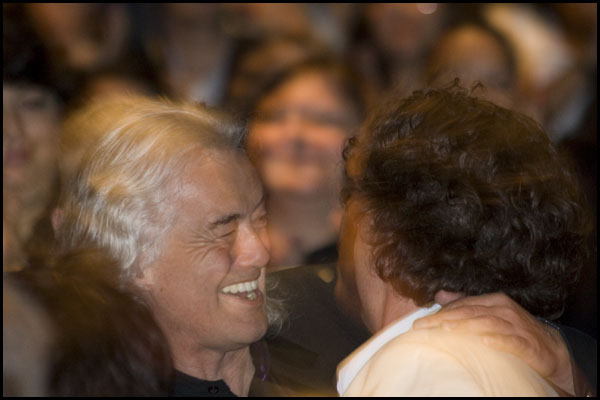 |
|
Jimmy and Director Davis
Guggenheim |
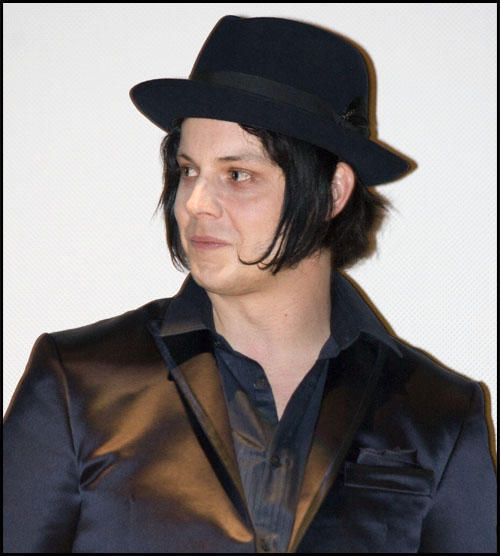 |
|
Mr.
White |
 |
|
Mr. Edge |
|
|
Burn After
Reading |
|
During last year's No
Country for Old Men press conference, there were no more than a few dozen
of us attending. The brothers seemed low key and disinterested, and the film
left the fest with hardly more than a blip of buzz from major critics (save,
naturally, this trusted critic). Going on to win Best Picture vindicated some,
but once again opened up expectation games for those quick to dismiss the
Coen's and their work.
Written during the pre-production of No
Country (similar to their work ethic during the Barton
Fink/Hudsucker Proxy era), they have followed last year's somber,
quirky film with a silly, quirky film. This is no simple comedy, yet has enough
farce and slapstick for laugh-out-loud moments. Borrowing from the Tony Scott
school of filmmaking (complete with Satelite imagery push in, and stern,
typed-in-turn screen text) we meet another bunch of clueless idiots in over
their heads, this time in Washington. When a CD is found in the changeroom at
Hardbodies, a blackmail plot is contrived to try and extort money from a fired
CIA agent without enough clearance to have any information that would do any
harm.
Snarling Russians, car chases, even gun play make for a
semi-authentic thriller, but it's contantly undermined by the moronic
activities of the central characters. The A-list actors milk their screen time,
fitting into their "character actor" roles with great zeal. Malkovich, bitchy
and aggravated in a housecoat, is outshone by Pitt's portrayal of a Hardbodies
excercise employee cum three year old, complete with his side-of-mouth sippy
cup. Clooney's almost as fun as he was in Oh Brother, and his "running"
gag is a delight, along with his metal working, sculptural skills. Finally,
wile it's certainly a pleasure to see Tilda being a bitch and McDormand nailing
her vapid role, the film is completely stolen by, of all people, J.K. Simmons
and David "Sledgehammer" Rasche. Summarizing the film neatly as some
beurocratic greek chorus, they point to the existential futility and moral
vacuity of Washington's populace.
Look for this to be a slow burn, with
repeated viewings and time being far kinder to this flick. Already some are
describing this as a disappointment ("nothing happens!") - this couldn't be
further from the truth. While no Lebowski or Miller's Crossing,
this is a top notch, silly piece of fun fluff, as if Michelangelo had dabbled
in black velvet paintings of clowns after that ceiling of his. Bravo, boys,
once gain you've released a triumph. |
|
 |
|
Directed by: Joel and
Ethan Coen
Grade: A |
|
|
The Good, the Bad and the
Weird |
Spaghetti westerns are a fine
indication of the incestuous nature of the history of cinema. The archetypical
American Western is retold with samurai in Japan, while the Italians took the
Japanese stylistic inventiveness, added their own flavor, set out to Spain and
shot their own version of the Western mythos. Leone's epic is reclaimed by
Asia, this time with the Koreans taking the helm of the genre. While last
year's MM Sukiyaki Django made for a sardonic
pastiche of Spaghetti conventions, TGTB&TW treats the source
material much more reverently. The plot is certainly delightfully
convoluted, involving Japanese soldiers, bounty hunters, Manchurian guns for
hire, and Korean ex-pats trying to eke out a living in the wilds of Southern
China. There are pretty women, grizzled men on horseback with oilskin coats and
stubble, and sinister villains. There are train robberies, gun battles and
kinetic action sequences that would put most Hollywood flicks to shame. By the
end, as the threads of the tale coalesce, there's a massive action/chase
sequence that's like an amped version of the truck chase in Raiders of the
Lost Ark. It's a spectacular, ridiculous 25 minute scene where even the
horses are exploding in the midst of the action. When the well telegraphed
ending comes to pass, the "treasure" finally located, we are left with a
further direct homage to Leone's original as the film calms down to the
inevitable tripartite confrontation. There's nothing subtle here, but
it's a tale well told, with exceptional sequences that directly nod to the
original film without succumbing to parody or ridiculousness. This is "action
porn" for any fanboy, with over the top scenes that are still directly tied to
the fun, frolicking plot. A heck of a ride, The Good, the Bad and the
Weird is a welcome, post-ironic nod to an early school of filmmaking, and
provides a great deal of joy and excitement for even the most jaded of action
movie fans. |
|
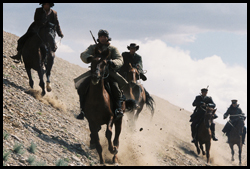 |
|
Directed by: Ji-woon
Kim
Grade:
A- |
|
|
Biggest Chinese Restaurant
in the World |
|
The setup is a good one -
exploring the radical changes that Chinese culture has undergone in this latest
period of growth, through the experiences of those at the 5,000+ seat
restaurant in a provincial town. Visions of epic kitchens, factory-like
conditions and massive rooms soon give way to the fact that we're about to
watch the daily events at what amounts to a theme-style restaurant, no
different than the banquet halls or theme park restaurants throughout the
world.
A little time is spent investigating the lives of the workers,
compared to their much more pampered bosses. The fact that a woman goes from
utter poverty to becoming a multi-millionaire is compelling, but after this
trivia is revealed, there's little else to be gained from the story as it's
repeated ad nauseum. The film suffers from the fact that it lacks focus, and
does little to say anything particularly revelatory about the situation.
Bonus marks are allotted, as always, for showing me something I've not
seen before. The scenes of competitive cooking, where live snakes are splayed
and served in bite sized chunks, still writhing, proved to be too much for some
in the screening. However, it's the preparation of "live fried fish" that
proved to be the most "exotic", where the cook wraps a towel around the fish's
head, dipping the lower portion in boiling oil. When served, flakes are picked
off with chopsticks from the rear, while the head remains untouched, a seeing
eye staring up, mouth seemingly gasping for breath, compulsively kissing
nothing but air. Over done, and the fish dies. Underdone, and the rear portion
looks like throbbing sushi.
It's hardly worth sitting through the whole
film for this little experience, but it's certainly the closest the film comes
to showing something truly different from the rambling mess of the rest of the
flick. |
|
 |
|
Directed by: Weijun
Chen
Grade: C |
|
|
It Might Get
Loud |
|
The conceit is music to the
ears of any music nerd - get Jimmy Page, Jack White and the Edge onto an
intimate stage, have them bring their gear, and have them talk about their love
of the guitar for a couple of hours. Film the results, and you have a hell of a
doc.
Unfortunately, while this January, 2008 meeting remains the heart
of the film, Guggenheim goes to great efforts to contextualize these musicians.
We see the Edge in Dublin, plinking away at his home studio. We visit the
mansion where some of Zeppelin's hits were recorded, visiting the hallway that
led to the booming drum sound of "When the Levee Breaks". And with Jack White,
we see him plink away at his cardboard guitar, recording direct to quarter inch
tape a funky, raspy blues.
These scenes are compelling, but they are
mere divertimenti from the main program. When you have Jimmy plunging into the
riff for "Whole Lotta Love" on the circle stage, you see the sides of the
Edge's lips curl into a smile, clearly reveling in the sheer joy of the moment.
Even the ever cool Jack finds the crack of a grin, as giddy as he ever is on
film in this moment of musical sharing. When the three sit down and tackle a
few of each other's songs, there's a genuine camaraderie captured onscreen.
Their final performance, plinking away at Robertson's "The Weight", is simply
excellent.
These moments could have made up the entirety of the film,
and it would have been all the better for it. This is one instance where
providing the context and expanding the scope may have in fact hurt the
project. This is a fine film, certainly worth experiencing, but I frankly would
have preferred it to have focused entirely on the meeting of the guitar minds
on that January day. |
|
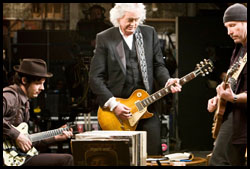 |
|
Directed by: Davis
Guggenheim
Grade:
B+ |
|
|
Detroit Metal
City |
|
A mashup of jaunty J-pop and
Death Metal drivel, what's not to love? Based on the celebrated Manga, this is
a pitch perfect film that certainly doesn't take itself too seriously. The
music is well made and produced, the situations a mix of hilarious and
charming, and the performances almost uniformly excellent.
It's the
tale of a small town boy, with a love of 70s pre-disco pop, who comes to the
big city to go to school. Negishi Soichi's passion is to make music, and he
hooks up with other like minded people interested in making "trendy", palatable
music.
While his musical heart is tied to bubblegum pop, he finds
himself a member of Detroit Metal City, the local Death Metal sensation.
Complete with Satanic lyrics and a "10 Rape" yodel, this alternate, offensive
personality masks the insecurities within. Torn between his responsibilities to
be the prince of darkness for his fans and his desire to bring warmth and
happiness to the world, he finds himself at a personal crossroads regarding
fame, life and love.
When the battle of bands sub-plot inevitably
arrives (he must battle, naturally, Gene Simmons) the whole thing cascades
towards a less-than-surprising ending. Still, plot contrivances aside, this
film has the trappings of discordant hard rock with the heart of romantic
comedy drivel, the very same ambivalence that tears at Soichi. Excellent,
fluffy fun with a fist pumping metal soundtrack, Detroit Metal City
will, to paraphrase one notable line of dialogue, make you wet with
excitement. |
|
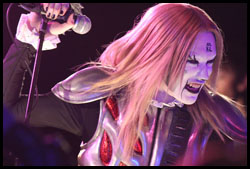 |
|
Directed by: Toshio
Lee
Grade:
B+ |
|
|
 |
|
